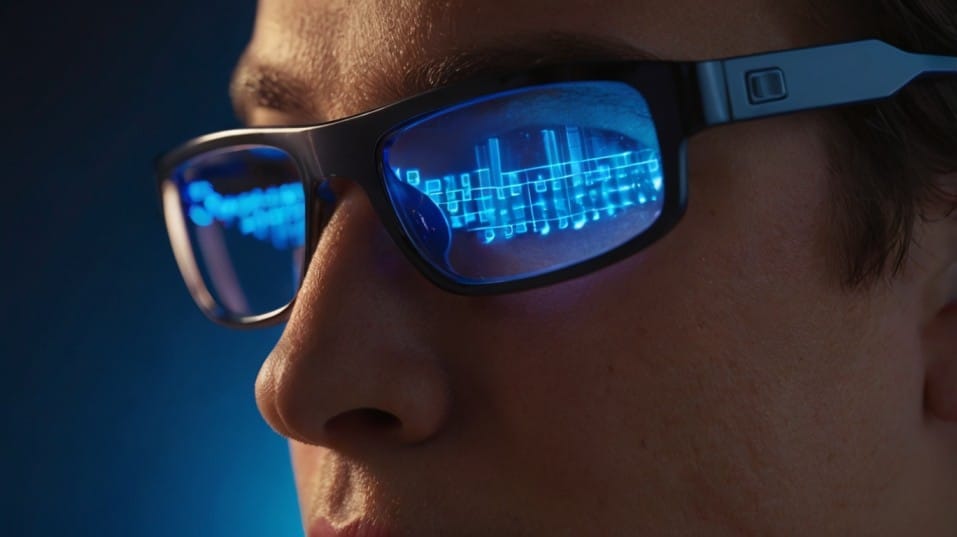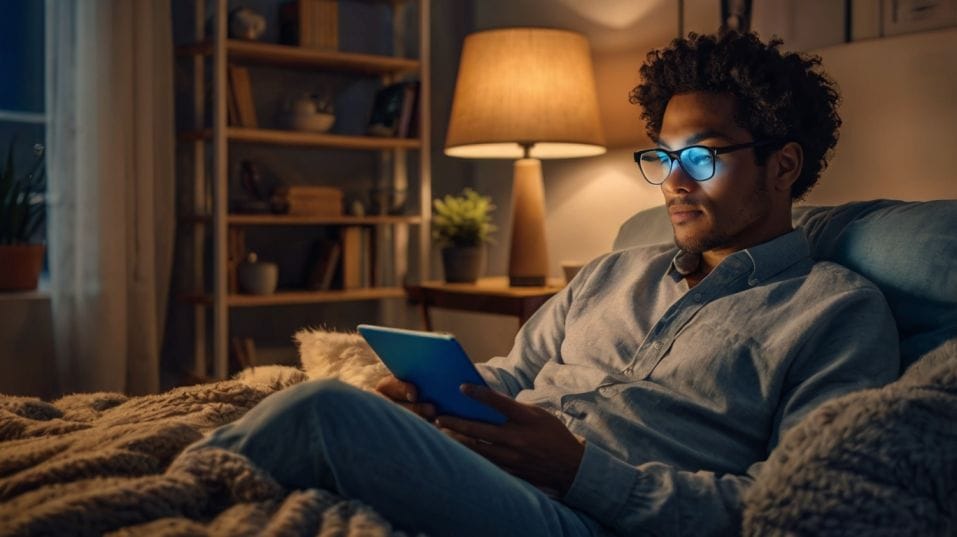Can Blue Light Glasses Actually Help You Sleep?
Struggle to fall asleep? Learn how blue light glasses can help reset your natural sleep rhythms and boost energy, focus, and recovery—easily.

Are you tired of feeling wired at night even after doing "everything right"? Kicking caffeine and meditating helps, but screens are a hidden enemy you might be overlooking.
Blue light glasses promise an easy fix—but can they really reboot your sleep? The science says yes, if you know how to use them the smart way.
Let’s break down how a simple shift in your evening habits could unlock deeper, faster, more refreshing sleep.
What Exactly Is Blue Light—and Why It Matters at Night
Blue light is part of the visible light spectrum, with a wavelength between about 400 and 495 nanometers.
It’s high-energy, short-wavelength light that naturally comes from the sun. That’s why daylight wakes you up, boosts your mood, and keeps your brain sharp.
But when the sun goes down, your body expects darkness. That darkness triggers a cascade of biological shifts—lower cortisol, rising melatonin, slower brainwave patterns—that prep you for deep sleep.
Modern life wrecks that signal. Phones, tablets, laptops, TVs, LED lights—they all blast your eyes with artificial blue light long after sunset.

Your brain thinks it’s still daytime, keeps cortisol high, suppresses melatonin, and tells your body to stay wired. You stay up longer, fall asleep later, and your sleep quality takes the hit.
Wearing blue light glasses tricks your brain back into its natural rhythm. They filter out the wavelengths that disrupt melatonin production, letting your body move into sleep mode even if your environment doesn’t.
How and When to Use Blue Light Glasses for Real Sleep Benefits
Timing and consistency matter way more than most people realize. You don’t need to wear blue light glasses all day.
That can actually blunt your daytime alertness. Focus instead on protecting your eyes during your natural "dim-light melatonin onset"—the two to three hours before you want to fall asleep.
Start winding down earlier than you think. Ideally, you’d start using your glasses around sunset, but realistically, make them a non-negotiable part of your nightly routine: put them on after dinner, around your wind-down time.
If you’re serious about improving your sleep, stack other simple moves with your glasses habit:
- Dim your overhead lights. Use lamps with warm bulbs instead of harsh ceiling lights.
- Set screens to “Night Mode” or use apps like f.lux or built-in settings like iPhone’s Night Shift to reduce screen brightness and blue light output.
- Cut screen time if you can. Even with glasses, less exposure is better.
- Stay consistent. One good night won’t rewire your rhythms. Habit locks it in.
Not all blue light glasses are created equal. Choose a pair that blocks at least 90% of blue light in the 400–450nm range.
Cheap "computer glasses" that only block 20–40% won't move the needle much. Look for brands that post real test results, not vague claims.
What Changes You’ll Actually Notice
It’s not magic—you won't suddenly sleep like a baby after one night. But within a few days to a week, real shifts happen.
First, you’ll likely fall asleep faster. Your brain won’t fight your bedtime as hard because it’s no longer getting the "it's daytime!" signal late at night.
Next, you’ll get deeper sleep. Quality matters more than quantity.
With less blue light disruption, your body can cycle properly through REM and deep sleep stages, meaning better cellular repair, stronger memory formation, and steadier mood regulation.
You’ll start waking up feeling naturally more refreshed, even if you don't massively extend your sleep hours. Over time, you’ll notice better:
- Energy: No more dragging yourself through mid-morning meetings.
- Focus: Sharper thinking, fewer mental wipeouts.
- Physical recovery: If you’re training hard, expect better muscle repair and performance gains.
- Stress resilience: More good sleep equals lower resting cortisol, better emotional control.
Small nightly wins build major momentum. Protecting your melatonin rhythm with blue light glasses creates a sleep foundation that amplifies everything else you do for your health and performance.
Why Blue Light Glasses Are a Smarter Move Than Overcomplicating Sleep
You don’t need to overhaul your life to start fixing your sleep. You don’t need five meditation apps, blackout curtains that cost a fortune, or total digital detox (unless you want that).
Blue light glasses are simple, low-effort, and proven to make a meaningful difference.
They work with your actual life—the work emails, the late shows, the nights you can't fully unplug. Instead of fighting your environment, you can outsmart it.
Think of them like strength training for your sleep drive: a small investment that unlocks outsized returns.
Final Thoughts: Start Smarter, Sleep Better
Blue light glasses aren’t just another wellness gimmick—they’re a science-backed, real-world tool to defend your sleep against modern chaos.
Wear a quality pair consistently during your evening routine, and you’ll tap into deeper recovery, stronger focus, and smoother energy every day.
Start tonight. Set up your environment to work with your biology, not against it. Throw on your glasses, dim the lights, wind down with purpose—and watch your sleep unlock a sharper, stronger you.




